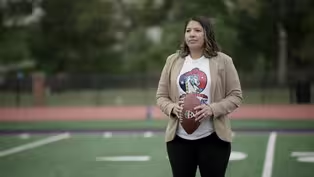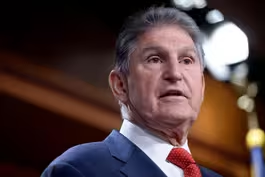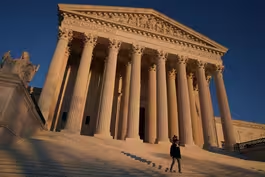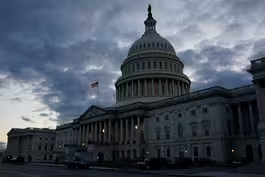
Nick Clegg on the challenges of AI content, misinformation
Clip: 2/7/2024 | 7m 26sVideo has Closed Captions
Meta's Nick Clegg on the challenges of AI content and misinformation
Meta’s policy for dealing with deepfakes and AI is under fire after it allowed an altered video of President Biden to remain online. Meta’s oversight board called the company’s manipulated media policies “incoherent” and “confusing.” Meta now says it will label AI-generated content as such in the months to come. Amna Nawaz discussed more with Nick Clegg, president of global affairs at Meta.
Problems playing video? | Closed Captioning Feedback
Problems playing video? | Closed Captioning Feedback
Major corporate funding for the PBS News Hour is provided by BDO, BNSF, Consumer Cellular, American Cruise Lines, and Raymond James. Funding for the PBS NewsHour Weekend is provided by...

Nick Clegg on the challenges of AI content, misinformation
Clip: 2/7/2024 | 7m 26sVideo has Closed Captions
Meta’s policy for dealing with deepfakes and AI is under fire after it allowed an altered video of President Biden to remain online. Meta’s oversight board called the company’s manipulated media policies “incoherent” and “confusing.” Meta now says it will label AI-generated content as such in the months to come. Amna Nawaz discussed more with Nick Clegg, president of global affairs at Meta.
Problems playing video? | Closed Captioning Feedback
How to Watch PBS News Hour
PBS News Hour is available to stream on pbs.org and the free PBS App, available on iPhone, Apple TV, Android TV, Android smartphones, Amazon Fire TV, Amazon Fire Tablet, Roku, Samsung Smart TV, and Vizio.
Providing Support for PBS.org
Learn Moreabout PBS online sponsorshipafter it allowed an altered video of# President Joe Biden to remain online.
This week, Meta's oversight board called the# company's manipulated media policies -- quote## -- "incoherent and confusing."
Meta now says# it's taking a number of measures to address## A.I.-generated content on its platforms, including# labeling them as such in the months to come.
Nick Clegg is president of global affairs at Meta,# and he joins me now to discuss these concerns.
Nick, welcome back to the# "NewsHour."
Thanks for joining us.
NICK CLEGG, President For Global# Affairs, Meta: Good to be AMNA NAWAZ When you begin to label images generated# an d Threads and Instagram, it's# going to look like this.
There's## going to be a little watermark in the# corner and a l I guess the question is, how do you know it's A.I.# if it's not generated on your own platfo have the tools to detect an A.I.-generated# image if it's created somewhere else?
NICK CLEGG: Yes, I mean, you make# exactly the right distinction,## which is, of course, if people use# our tools to generate A.I.
images,## we know that and we can watermark# that.
And we do that already.
So if you use one of our tools to concoct an# image using A.I., there's a wh ich makes it very clear that it's not a# sort of real photograph taken by a human## being.
Your question, quite right, is,# what happens when someone uses someone## else's tools -- and they're more and more# of them and they're multiplying -- seeks to share it with their friends and# post it on Instagram, Facebook, Threads?
And I think we have made some real progress as an# industry within the -- kind of under the umbrella## of an organization called Partnership for A.I.,# which brings together a lot of the main players## to develop common standards so that, when# we, as it's sort of called in the jargon,## ingest, in other words, when we bring on to our# platform because someone's sharing it on Instagram## or Facebook something which has been concocted# elsewhere, has been generated elsewhere, there is## an invisible watermark, something which allows# our technology to automatically identify it.
And then we can choose, as we will choose,# to label it, so users can distinguish between## what is human and not human, what is# synthetic and what is not synthetic.
AMNA NAWAZ: And to be clear, Nick -- I apologize## for the -- is that somethi NICK CLEGG: It's something we can# do now with images and we will be## instituting in the weeks and months to come.
But the difficulty is, the technology doesn't# ki nd of common standards on audio or video# content.
And, of course, there's always the## risk that people who want to use these tools for# malicious purposes will try and evade those rules.
I don't think it is a perfect solution.
But just## because it's not perfect does not# mean that we shouldn AMNA NAWAZ: Right.
now in keeping with the state of# the technology as AMNA NAWAZ: Well, let me ask you about your# policies as they exist today, because it was## your own oversight board that said your current# policies are There was this video that spread# on Facebook last year.
It was the## unaltered original video showed President# Biden placing an "I voted" stic granddaughter's chest.
The manipulated# one, the fake one made it look as if he## was repeatedly inappropriately touching# her.
And that spread quite a bit.
You made the decision to leave it up.
Why# did that video not violate your rules?
NICK CLEGG: Well, I should be clear.
The oversight# board said that we were right to keep it up,## and they actually criticized us for being# inconsistent about when we remove content.
And they basically said that trying to play# Whac-A-Mole and remove individual bits of## content is inconsistent and not effective.
So# what we're saying this week is very much in## keeping with the critique that the oversight# board delivered.
Namely, we are now going to## label much more visibly for users on a much wider# scale content that is artificially generated.
(CROSSTALK) that video showed a presidential# candidate doing something he did not do.
How worried are you that those kinds of# videos are going to be spread even more## widely, and they actually could help spread# dangerous information in a key election year?
NICK CLEGG: Well, I don't think# it will be that dangerous as## long as we can tell users that it is# An d do remember, of course,# that any synthetic content,## any A.I.-generated content about any of# the candidates will immediately be noticed## by those candidates.
So I don't think# there's much risk that it'll go somehow## unnoticed and many millions of people# will see it and no one will real And we will then, of course, be able to move -- if# our automated systems in the way that I described## earlier haven't caught it already, we will then# be able to label it.
So I'm -- I certainly don't## want to be complacent, but I think considerable# efforts will be made by us and others to make## sure that users can, to the very best of our# powers, be able to distinguish between something## that has actually been produced authentically# and something which has been produced by A.I.
And I hope also, in -- alongside our policies,## which mean that no one can run a political ad# on Facebook or Instagram without declaring an disclosing that they have used A.I.
-- and# if they do that, and they systematically## try and avoid that policy, we will,# of course, take action against them.
(CROSSTALK) but I want to make sure I'm# respectful of your NICK CLEGG: Sure.
AMNA NAWAZ what does that mean?
You wil NICK CLEGG: Yes, we have got# a whole range of penalties,## which, of course, could start with a# right through to basically saying they# can't run ads on Faceboo There's a range of penalties that we# can apply.
And I would have thought most## mainstream campaigns would want to retain# the ability to communicate with political## ads on our platform.
So I think they have# got a huge incentive to play by our rules.
AMNA NAWAZ: And, Nick, what's the# role for lawmakers here?
I mean,## there was a bipartisan bill that would# officially ban that deceptively portrays candidates# for federal office in political ads.
Do you support that bill?
NICK CLEGG: I haven't looked# at that bill specifically,## but I do think there is very much# At the end of the day, we're talking here# about the policies that we have developed,## to the best of our abilities, about how# users will be able to and viewers will be## able to decide whether -- for themselves# whether something is A.I.-generated or not.
But when it comes to elections, the elections# belong to the people, to the country,## not to big tech companies.
And it really# should be as part of the democratic process,## for democratic politicians to come# together across party lines and## decide for themselves the guardrails# that they want to apply in elections.
And we, of course, will abide by# whatever guardrails they come up with.
AMNA NAWAZ: That is Nick Clegg, president of# global affairs at Meta, joining us tonight.
Nick, thank you very much.
Good to see you.
NICK CLEGG: Thank you.
A Brief But Spectacular take on building a team
Video has Closed Captions
Clip: 2/7/2024 | 2m 58s | A Brief But Spectacular take on building a team (2m 58s)
Experts discuss Gaza cease-fire negotiations
Video has Closed Captions
Clip: 2/7/2024 | 10m 44s | Experts discuss Gaza cease-fire negotiations as Netanyahu rejects Hamas' latest terms (10m 44s)
Manchin says immigration deal fell apart because of politics
Video has Closed Captions
Clip: 2/7/2024 | 8m 22s | Sen. Manchin criticizes colleagues, says immigration deal fell apart 'because of politics' (8m 22s)
Militia hit by U.S. claims it didn't attack American troops
Video has Closed Captions
Clip: 2/7/2024 | 7m 42s | Militia hit by U.S. airstrikes in Iraq claims no connection to attacks on American troops (7m 42s)
Supreme Court to decide if Colo. can block Trump from ballot
Video has Closed Captions
Clip: 2/7/2024 | 5m 21s | Supreme Court to decide if insurrection clause can block Trump from Colorado ballot (5m 21s)
What's next for border after GOP blocks bipartisan bill
Video has Closed Captions
Clip: 2/7/2024 | 6m 13s | What's next for border policy, Ukraine aid after Senate Republicans block bipartisan bill (6m 13s)
Providing Support for PBS.org
Learn Moreabout PBS online sponsorship
- News and Public Affairs

FRONTLINE is investigative journalism that questions, explains and changes our world.

- News and Public Affairs

Amanpour and Company features conversations with leaders and decision makers.












Support for PBS provided by:
Major corporate funding for the PBS News Hour is provided by BDO, BNSF, Consumer Cellular, American Cruise Lines, and Raymond James. Funding for the PBS NewsHour Weekend is provided by...





